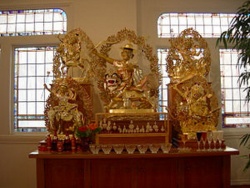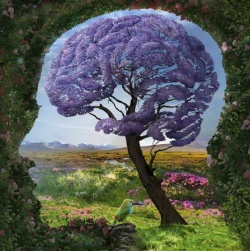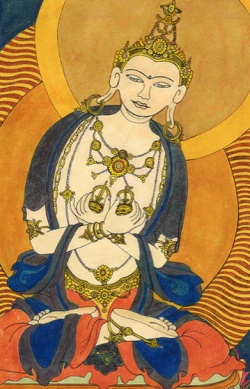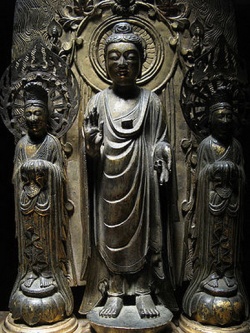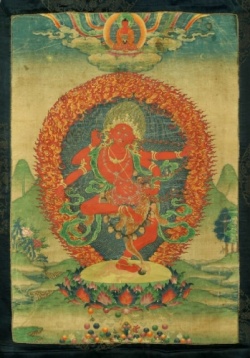Progressive Buddhism: I am a Western Buddhist
written by Kyle
Do not go upon what has been acquired by repeated hearing; nor tradition; nor rumor; nor what is in a scripture; nor surmise; nor axiom; nor specious reasoning; nor bias towards one’s beliefs; nor upon another's seeming ability; nor upon the consideration, 'The monk is our teacher.' When you yourselves know: 'These things are good; these things are not blamable; these things are praised by the wise; undertaken and observed, these things lead to benefit and happiness,' enter on and abide in them.
James Ure, who is an excellent blogger and a great asset to the Buddhist blogging community, over at The Buddhist Blog, wrote a wonderful and thought provoking piece a couple of weeks ago entitled "Do we really need Western Buddhism?" James writes;
"In the end It doesn't come down to any of this--these labels are mere fingers pointing to the glorious moon. It comes down to the present moment where labels mean nothing. However, it is an issue that needs to be discussed and fine tuned because right now "western Buddhists" are like a man without a country or a ship without a sail adrift in a sea of opposing currents and shifting winds."
I was going to answer him on his blog, but I felt like this needed its own post. I like this comparison with "being a man without a country", and I see everyone of us in this great big web of people, sharing ideas as those who are now, shaping and defining our practice and our traits. I completely agree, I don't think labels are all that great, however, in this relative world some labels can help build a community and sense of belonging to all those afloat in a sea of uncertainty. I feel we already have defined and created a new tradition of Western Buddhism, however with all the different people and pages, I think its hard to put our finger on and define the wonderful community that these sites, blogger's, contributors and readers have helped forge. They are all pioneers, just like any of you reading this now are.
Another excellent writer on modern Buddhist thought, Lawrence Levy, wrote "We do not see ourselves as inventors of something new but as stewards carrying into our own culture and time an extraordinary methodology for inner development." I think this idea of stewardship is an important one. Many great teachers in the last 40 years have brought the essence of Buddhist teachings, stripped of unneeded dogma and culture westward, and it is up to all of us to carry this spirit of innovation and enthusiasm forward, so the next generation has a solid foundation to help them find there own way.
Why do I say Western Buddhism exists already?
That which binds us together:
Most all of us are from countries that are representational Democracies, who's governments power ultimately derives, (to borrow the words from Abraham Lincoln) "of the people, by the people, for the people" and "conceived in Liberty, and dedicated to the proposition that all men are created equal.". We all come from societies and cultures that place a high value on equality, justice, tolerance and the rule of law, even though we realize many times it is an imperfect system. Our cultures have a broad and well entrenched tradition of individual liberties and freedoms, such as speech, the press and freedom from and of religion. Most of us also come from countries already steeped rich in diversity, who draw strength, not weakness from these differences. Our perfection lies in our knowledge that we are imperfect beings and hence we can always learn from others.
For most of us Westerners, Buddhist study is not something we were born into, pressed into by culture, family or tradition, but approached by our own curiosity and initiative, with a free will and as true beginners. We all place logic, reason and good judgment over believing what is told to us out of a book or a sermon; relying on understanding over dogma and experience over blind faith. Look at our community now, I find it very difficult to find any individuals that won't discuss openly and freely their own particular practice with anyone from any other tradition. We have, by our very open mindedness and divergent backgrounds made accessible the whole enigma that traditional Buddhism used to be, into something that is shared in an accessible and candid community. It is very difficult to find this anywhere else in this world, as practice for many traditional Buddhists is much more culturally based, and not often shared between denominations.
We already have a bustling, open and prodigious community of Western Buddhists. Even though we may not know it, we already have a this and it is most definitely reflective of the diverse cultures we all hail from. Winston Churchill wrote "Where my reason, imagination or interest were not engaged, I would not or I could not learn." I could not agree more.
Diversity:
We do not need to wear cultural or traditional robes, but we accept and can learn from those that do.
We do not need to bow to statues or even each other, but we accept and can learn from those that do.
We do not need to be Zen, Tibetan, Theravada or of any of the many other ancient Buddhist traditions, but we accept and can learn from those that are.
We do not need to shave our heads and join some remote monastery, but we accept and can learn from those that do.
We do not need to believe or not believe in God; or be Chiristian, Muslim, Hindi, Jewish, Atheist, Agnostic or any of the other countless traditional religions, but we accept those that are and can learn from them.
We reject the extremes of all human indignities and realize the best path lies usually somewhere in the middle.
We realize that conquering the problems and hardships of this life, and answering the profound questions of a spiritual life are not separate, but are intimately and irrevocably intertwined.
This is why I am not shamed to say I am a Western Buddhist.
We have found common ground from where we all can help each other up whatever our individual practices we may embark on. With the tens of thousands of pages of sutras, writings and teachings, we can boil off a lot of the extra words, and find universal principles to build upon.
Common Principles
Three Basic Principles
Anicca - We must experience and understand the impermanence of all things.
Dukkha - We must experience all the hardships, problems, suffering and unsatisfactoriness of this life and search for the cause of them.
Anatta - We must search for self, understand its beginnings and ends, experience its true form and nature.
Those that have come before us said it is possible, with our inherent human ability and effort, that with acute attention to this moment, awareness of how all things arise and fall and our interconnectedness with all that is, ever was and ever will be, that we can find some answers, some relief and some genuine understanding of the true nature of our existence. We should not take any one answer for truth, but test it and see for ourselves these things. Many traditional Buddhists may emphasis one type of practice over another or one aspect of teaching over another. I think we all here share in the idea, for each person has there own path, for which they must find for themselves. Taken as a whole, our community gives all three aspects of Buddhist practice the same weight, each having equal emphasis towards the goal. The Buddha called this the noble eightfold path.
Three Pillars of Practice
Understanding - The wisdom and science of Buddhist philosophy is what draws many of us here and I think it is so extremely important to gain a conceptual handle of what "is being pointed to" in able to move our practice forward.
Practice - We must all find our own way of meditation, weather it be ZaZen, a Tibetan mantra, a Theravada Vipassana process, a combination of all three or something completely new. Mindfulness of mind, perfection of concentration is something that is very person specific, and with right effort can be attuned to every individual as a mature and seasoned practice.
Compassion - When we can understand that we exist because of everything else, and are not separate from one another, we can find compassion for all beings, even in the face of ignorance and intolerance. We may find compassion because we see how they suffer or struggle. We can perhaps see how our words and our actions affect others and ourselves, and maybe we can find some sense of compassion and love to help not only them, but more importantly, yourself. A moral life should not be pursued because you think its the right thing to do, we should make some effort to see WHY it is the right thing to do.
The Canadian Poet, Irving Layton, once somewhat sarcastically wrote "A Canadian is someone who keeps asking the question, 'What is a Canadian?'" Maybe we can, in a much more deliberate and determined effort ask, "What is a Western Buddhist?" The answer is shaped by each and everyone of you, in every word you say and in every moment that passes.
Even if I am the only one, I am not bothered and I am not ashamed to say, I am a Western Buddhist.
